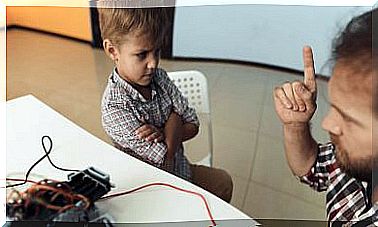Teach Your Kids Self-control! Put Words To Your Feelings

Surely you have ever felt frustration or embarrassment when your child has had a tantrum in the middle of the mall or has suddenly decided to throw himself on the floor crying in the middle of a meeting with your friends. Do not despair, or feel bad. Teaching your children self-control is possible, but it is a task that will require time, patience, and love.
Learn to understand their emotions
The first thing you must understand is that your child from a very young age will begin to experience all kinds of emotions that he will understand only with time.
You will see how he feels angry at times because he wants mom to take him at all hours and does not want to stay in the car, he will feel annoyed because he is very sleepy but does not know how to solve it or fear that you leave and leave him with someone else.

In such a way, it should be the parents who develop the virtue of teaching them to channel every emotion that their children experience as they grow older. Teach from the base of love and respect so that you get good results in a short time.
Put words to your feelings
It is absolutely necessary that you be able to put words to your little one’s feelings. That is, explain that it is normal for them to feel annoyed, sad, or very happy, but they should try to keep calm. Ask how you can help, or simply offer a hug. Any of these alternatives will be better than losing your patience, screaming and stressing your entire home.
You must not forget that our parents are role models. So when your child is a little older and you experience some emotion, it is a good time to explain what you feel and why. This will help you understand that feelings are part of the very nature of being human and that we all experience them on a daily basis.
4 keys to teaching self-control
Understanding and explaining the different kinds of feelings to your children will help you a lot to begin to control certain situations. Here are some key aspects to make teaching your little ones self-control much easier:

Reinforce positive behaviors
¨Thanks for helping me, you did very well¨… are just some of the phrases you can use to reward your child for his positive actions. This is a fundamental point for them to understand, little by little, which are the accepted behaviors and which are inappropriate.
Discipline without violence
Spanking or hitting the hands is a discipline used by many parents. However, psychologists affirm that this measure has long-term emotional implications and also there will come a time when your child will become immune to that punishment and will lose all effect.
Set standards
You must establish rules that are in accordance with the age of your children. You can’t pretend that a 1-year-old knows how to understand your frustration because there is a lot of toy clutter in the room or he threw the whole dinner on the floor. You must always keep in mind that you are the adult and you must understand what behaviors are normal for the age and how to educate.
Explain daily rules that he can learn according to his age. For example, what is the play area, how to put the toys in the basket or why not throw the food away. With this practice, you will be able to learn role models much faster than you think.
Don’t give importance to tantrums
Children are only looking to get your attention. If with a tantrum your child manages to get you out of your boxes, he will surely repeat it much more frequently, because your little one will be achieving his goal, which is to focus all his attention on him.
If instead you put a twist on the strategy and show indifference, it will quickly forget to repeat this pattern. Pay attention to situations that really require it, such as trying to hurt yourself or attack someone else.
Respect for your children’s feelings, patience and love will be your best friends when teaching your children self-control. Never ignore their emotions, give them the importance they have, show how to channel them and in this way they will improve little by little all the behaviors of your children that were previously very worrying to you.









